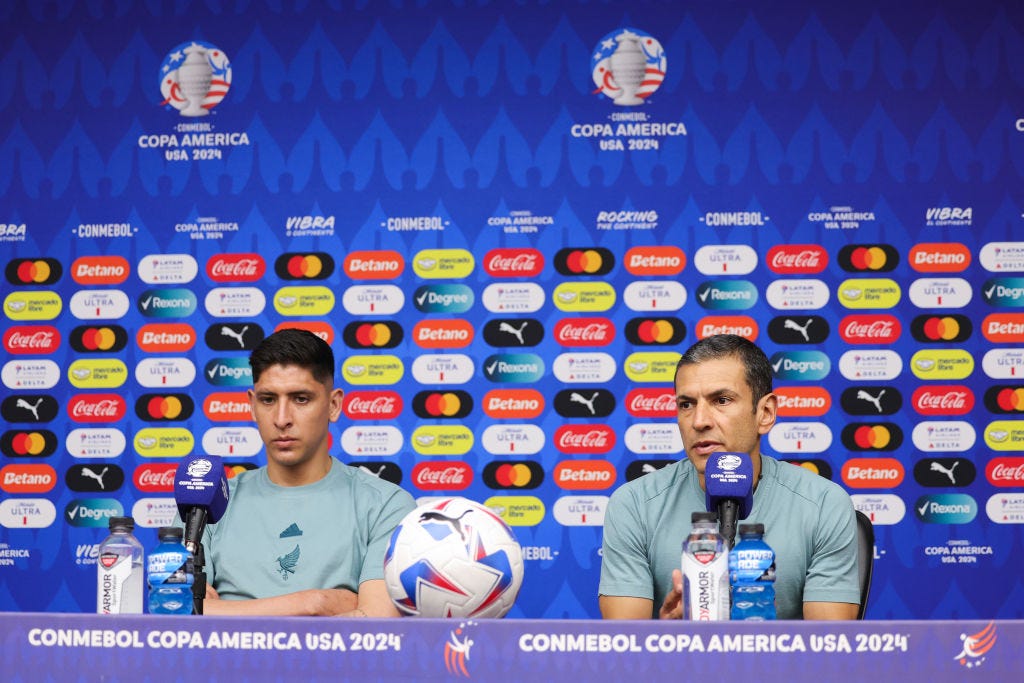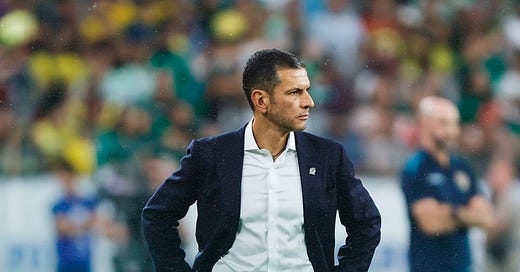Past Mexico national team managers have understood the gig. In news conferences and behind closed doors, they’ve joked about the realities of the role. “Rent. Don’t buy,” some have said about their housing strategy. All understand the pressure put on them by directors, by fans and by the press.
Nobody ever has understood it as well as Jaime Lozano.
The departing Mexico national team manager was forged in the fires, not just of Mexican soccer but of the modern game in Mexican game. He played for El Tri between 2000 and 2007 and was in Liga MX until 2013 (nearly going to play with Alebrijes de Oaxaca but ultimately turning down the offer).
Before, during, and after the Gold Cup he won as the interim manager, Lozano nodded to the fact he would do whatever he could to help Mexico for as long as he was leading the team.
“I’m thankful to live this moment. When I became a manager, it was a dream of mine to coach the men’s national team. A few days ago I told my staff, if nothing had happened, I’d be just another fan watching my national team. We’ve got to be thankful and enjoy the match.” These are the words of Lozano not in a statement bidding farewell but rather after his very first match, a 4-0 win over Honduras in the Gold Cup when it felt like anything was possible and the “LamborJimmy” was beginning to get fired up.
It started but never purred, with the manager unable to put together the parts he needed to get Mexico to consistent success against other teams’ in the Americas strongest sides.
He planned for the long-term, but focused on the present, knowing his time leading the national team would be short.
He would’ve liked it to be longer, having achieved Copa América success, beating the U.S. in the Concacaf Nations League and leading the team into the 2026 World Cup. Instead, he was offered a demotion. He declined, and he’ll be better off for it.
“In recent days, a long-term alternative was proposed. Jaime Lozano, along with his coaching staff, was offered a contract until 2030, during which from 2024-2026 they will accompany a manager with more experience on the way to our World Cup. And, after that, it would be Jaime himself retaking the reins of the managerial job in the 2026-2030 process,” an FMF statement read.
“After analyzing the proposal, Jaime Lozano communicated to us that he does not want to continue. We respect his decision and recognize his great professionalism, ability and commitment.”
Lozano does have those qualities. And he knows the Mexico national team setup well enough to know that the dangled carrot of 2030 was hardly one he could be sure he’d enjoy.
He also has more experience than the federation is implying. Lozano worked at Queretaro and Necaxa before leading the Olympic squad to the bronze medal in Tokyo.
My hunch is that Lozano is legitimately bummed out to no longer be leading the Mexico national team. I buy the federation’s line that it saw him as the coach of the future. But staying together for the kids - the ones who will be suiting up for Mexico at the 2030 World Cup in Uruguay/Argentina/Paraguay/Spain/Portugal/Morocco - wasn’t the best situation for anyone.
Lozano needs to spread his wings and find a new opportunity, be it another Liga MX job, something in MLS, or even finding a taker in Europe or South America. His results there will be a far better reflection of his coaching ability than what he achieved with a Mexico player pool in transition, trying to force through a generational change.

And Mexico wants to go back to the status quo, bringing in an old hand who will be more predictable.
The FMF’s statement goes on to say that in the first week of August it will announce “the adjustments that will be implemented to the national teams project to keep building in the short-, medium- and long-term.”
In the short-term, we expect that to mean the “Gracias Jamie” graphic is followed up by a “Bienvenido Javier Aguirre” one.
Aguirre is a good manager with experience both in Mexico and abroad. He’s led Mexico twice before, most recently in the 2010 World Cup in South Africa. A lot has changed in soccer since then, and Aguirre largely has adapted. Still, he feels more like a throwback when the Mexican federation is trying to convince fans that it’s a new day, one in which El Tri can get to the fifth or sixth game of the World Cup.
The 65-year-old Aguirre also had a long playing career, suiting up for Mexico nearly 60 times between 1983 and 1992. But that continues to be the problem for any Mexico manager: That they no longer can suit up and put the ball in the back of the net, provide a line-breaking pass from midfield or avoid mistakes at the back.
OK, one time Aguirre tried to put in a tackle, but that was a different situation:
No matter who comes in as Mexico boss, they’re stuck with the current pool of players they have. The federation may make a last-minute change and opt for one of the top coaches in Liga MX: Pachuca’s Guillermo Almada, Cruz Azul’s Martin Anselmi, Club América’s Andre Jardine. They’ll all have the same, limited group Lozano worked with.
Lozano goes off to forge his own path, finding another job where he can learn and develop away from the bright lights always shining on the Mexico manager. Aguirre’s arrival shows there’s no reason El Tri might not be in his future once again, anyway.
Lozano is better off going that route. The question is whether or not his departure will make any difference for a Mexico national team stuck spinning the tires, no matter what the vehicle or who is in the driver’s seat.





